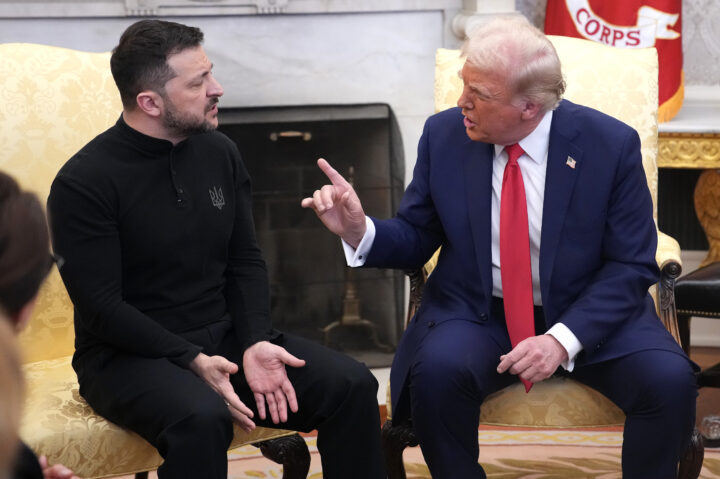Washington’s U-turn on Ukraine a ‘challenge’ for Israel, experts say
‘What happened in the White House with Zelensky shows that the U.S. doesn’t have a constant policy or permanent allies,’ Chatham House senior fellow and former Knesset member Ksenia Svetlova said

Andrew Harnik/Getty Images
President Donald Trump and Ukrainian President Volodymyr Zelensky meet in the Oval Office at the White House on February 28, 2025 in Washington, DC.
The almost 180-degree shift on Ukraine from the Biden administration to the Trump administration — from vocal support and a flow of weapons to the threat of a halt of arms shipments and a call to abruptly end the war without security guarantees, is almost a mirror image of the change in Washington when it comes to Israel — where there were freezes on some weapons and a cease-fire plan that would keep Hamas in power and now $4 billion in arms were approved and the White House supports Israel blocking aid to Gaza.
Yet, after President Donald Trump’s confrontation with Ukrainian President Volodymyr Zelensky last week, some experts are warning that the implosion of ties between Washington and Kyiv could have ramifications for Israel.
According to Chatham House senior fellow and former Knesset member Ksenia Svetlova, “what happened in the White House with Zelensky shows that the U.S. doesn’t have a constant policy or permanent allies. If there are no permanent allies, if Ukraine is thrown into the trash after all these years … no one is immune.”
According to Svetlova, the fact that the Biden administration froze some weapon shipments to Israel amid domestic political pressure shows that “there are no holy cows, not even Israel.”
“Even in the current term, Trump can change. If there are no constant interests or doctrines, that means anything can change. Israel must be prepared to become like Ukraine,” she said.
Emmanuel Navon, CEO of European pro-Israel organization ELNET and an international relations lecturer at Tel Aviv University, argued that while Trump could theoretically change his mind at any time, Israel is in a different situation because it has strong backing in Trump’s coalition of supporters.
“Ukraine is a place that most Americans don’t really care about, especially not Trump’s constituents,” Navon said. “Israel is important to evangelical voters. Trump cares about his voters and they care about Israel, not Ukraine.”
As for the cease-fire agreement that the Trump administration is trying to negotiate between Russia and Ukraine, Svetlova warned that Trump is “forcing an agreement without a security guarantee [for Ukraine] after three years of a war started by a violent neighbor … No defense will come of that.”
Yet, Svetlova said there is no comparison to the Trump administration’s involvement in Israel-Hamas cease-fire negotiations, where Israel has every advantage over Hamas – with the notable exception of the hostages.
Rather, Svetlova said, Trump’s approach to Ukraine could be a warning sign to Israel that he may push an Iran nuclear deal that is not sufficiently robust.
“It’s a matter of life and death for Israel,” she said. “The Saudis and Emiratis are in the same boat. [The countries] need to seriously discuss a policy not to cross Trump but also not to be a victim of this kind of coercion.”
The fact that Ukraine policy is creating a rift between the U.S. and Europe is also a problem for Israel when it comes to a coordinated response to the Iranian threat. The U.K., Germany and France are the only Western countries with the power to snap back all pre-2015 sanctions on Iran, an ability that expires in October.
Svetlova suggested that Israel plays a mediating role between the U.S. and Europe on Iran, pointing out that “sanctions will be much more effective if there is unity in the Western world on this. Any division is not good for us.”
Navon described European leaders as “completely horrified” at the Trump-Zelensky meeting.
Still, Navon said that there is an opportunity for Israel in the Trump administration’s confrontational attitude towards Europe, citing Vice President J.D. Vance’s speech in Munich last month: “He castigated the Europeans, but said that if you want America to have your back, you have to be more respectful of our common Western values based on Christianity.”
He noted that the European right sees Israel as “one of the pillars of Western civilization” defending those values.
“This is great for Israel because you have quite a few conservative parties in Europe who are open to this message and supportive of Israel,” Navon added. “Israel can use this rift between the U.S. and Europe to its advantage.”
At the same time, Navon pointed to a vote in the U.N. General Assembly last week, in which Israel, under pressure from the U.S., voted against a Ukrainian resolution asserting the country’s territorial integrity and condemning Russia for invading. Other countries that voted that way include Russia and North Korea.
The new American position on Ukraine “is a challenge for Israel,” Navon said. “When you see the other people who voted against the resolution last week, it makes us look really bad.”
Svetlova said that the U.N. vote was an example of how Israel “will be in great distress” as Trump continues to challenge Western governments’ near consensus on Ukraine.
“Israel is still a liberal democratic state. We are part of the camp of Western Europe, Japan, Australia, Canada, certainly not the autocratic camp of Russia, North Korea, etc.,” she said. “What else will the Americans ask us to do that contradicts our identity? We want to be copacetic with countries that are like us.”
The transatlantic alliance and that of liberal, democratic states worldwide against autocrats was damaged by the Trump administration trying to force a cease-fire with no security guarantees onto Ukraine, Svetlova argued.
“We don’t know what the ramifications for [Israel] will be yet, but when the liberal West is harmed, [Israel] will also be harmed,” she said.
































